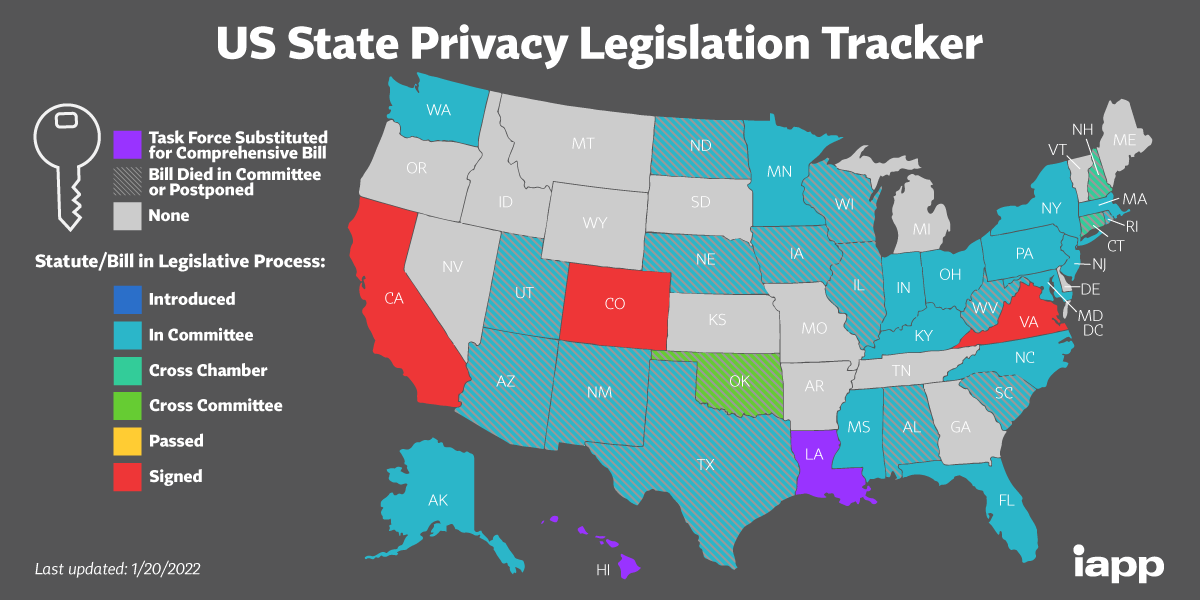What to Know About Data Privacy Compliance in 2022
Data privacy compliance can sometimes feel overwhelming.
Sure, your business must be compliant if you’re processing or storing customer data. But new regulations – and penalties – seem to change frequently.
Despite the confusion, it’s important to prioritize data privacy as part of your wider efforts to streamline and modernize all operations and processes.
Why? According to a Bloomberg study, more and more companies are identifying terms like privacy, cybersecurity, and data protection —underscoring the role that data privacy plays in boosting corporate reputation.
Data Privacy Compliance: GDPR vs. State Laws
 Source: IAPP Westin Research Center, updated 1/20/22
Source: IAPP Westin Research Center, updated 1/20/22
The General Data Protection Regulation (GDPR) protects any individual located inside the European Union – but the U.S. doesn’t have a similar federal law. Instead, each state has various rules to regulate the use of data.
California, Virginia, and Colorado have rolled out varying degrees of data protection laws:
- California Privacy Rights Act (CPRA), which expands the previous California Consumer Privacy Act, will take effect in 2023.
- Virginia Consumer Data Protection Act (VCDPA) will go into effect in January 2023.
- Colorado Privacy Act (CPA) will go into effect on July 1, 2023.
As you can see from the map above, expect more states to announce their own rules. The good news for most businesses is that if you’ve been subject to California’s privacy act, you should be able to use that existing framework to comply with additional state regulations.
In most cases, these state laws empower consumers to opt out of a business processing their personal data; access, correct, or delete the data; or obtain a portable copy of the data.
What are the key differences in simpler terms?
Essentially, the GDPR requires that you have a legal basis for collecting personal data (e.g., “give consent”), whereas U.S. state laws basically enable residents to control how their personal information is collected (e.g., “opt out”).
Does My American Company Even Have to Worry about GDPR?
The short answer is yes. GDPR rules apply to organizations that may actually have little to do with the European Union.
Let’s look at some possible examples:
- You’re a U.S. business based in Chicago, working mainly with companies in Illinois. If you track and/or analyze EU visitors to your company’s website, then you may be subject to certain GDPR provisions.
- You’re a U.S. business that occasionally sells goods or services to EU residents. For example, you’ve created ads in German or Italian, or you’ve included pricing in euros on your website. If you’re marketing to EU residents, then you must be GDPR compliant.
If this sounds confusing, you’re certainly not alone. McKinsey & Co. has called GDPR “an ongoing challenge” and suggests that all companies think of data protection as a strategic asset that will promote long-term sustainable growth.
Mobile Forms in the Privacy Age
Mobile forms give you a modern way to streamline data collection, integrate data into your processes, and share data to anyone who needs it. Device Magic offers robust security – and is a great tool for collecting form data, whether your business falls under HIPAA, GDPR, OSHA, or any other business-specific requirements to ensure data is processed and stored properly.
Device Magic customers can build what they need – an inspection checklist app, a site surveying app, and countless other use cases.
The form delivery infrastructure and customer data is hosted securely on Amazon Web Services on the U.S. east coast. For customers that require stricter control of their data, we offer region-based hosting options. This will ensure your data never leaves your region. Known as “multi-region server support,” this is an upgraded feature that allows Device Magic’s enterprise customers to secure their data within a specified region. It’s as simple as choosing a server region to secure data.
Regionalization solves some important concerns for Device Magic customers:
- Enhanced security. Businesses that must adhere to GDPR laws obviously have greater legal responsibilities for how they collect and store data. Compliance with GDPR also regulates how a company responds to data breaches. However, even businesses that don’t need to adhere to GDPR laws but are “security-minded” may wish to control their data locations for the same reasons.
- Performance. Multi-region support may also enhance platform performance. Hosting data locally may improve load times and delivery speed.
Our smart forms app makes it simple! Automate how work is done and replace outdated processes and expensive paperwork. Efficiency isn’t the only reason to use digital forms – security improvement is a great reason as well.